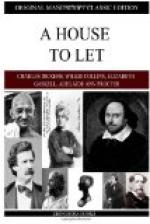“Quite right,” I said.
“The second daughter,” Trottle went on, “and Mr. Forley’s favourite, set her father’s wishes and the opinions of the world at flat defiance, by running away with a man of low origin—a mate of a merchant-vessel, named Kirkland. Mr. Forley not only never forgave that marriage, but vowed that he would visit the scandal of it heavily in the future on husband and wife. Both escaped his vengeance, whatever he meant it to be. The husband was drowned on his first voyage after his marriage, and the wife died in child-bed. Right again, I believe, ma’am?”
“Again quite right.”
“Having got the family matter all right, we will now go back, ma’am, to me and my doings. Last Monday, I asked you for leave of absence for two days; I employed the time in clearing up the matter of Benjamin’s face. Last Saturday I was out of the way when you wanted me. I played truant, ma’am, on that occasion, in company with a friend of mine, who is managing clerk in a lawyer’s office; and we both spent the morning at Doctors’ Commons, over the last will and testament of Mr. Forley’s father. Leaving the will-business for a moment, please to follow me first, if you have no objection, into the ugly subject of Benjamin’s face. About six or seven years ago (thanks to your kindness) I had a week’s holiday with some friends of mine who live in the town of Pendlebury. One of those friends (the only one now left in the place) kept a chemist’s shop, and in that shop I was made acquainted with one of the two doctors in the town, named Barsham. This Barsham was a first-rate surgeon, and might have got to the top of his profession, if he had not been a first-rate blackguard. As it was, he both drank and gambled; nobody would have anything to do with him in Pendlebury; and, at the time when I was made known to him in the chemist’s shop, the other doctor, Mr. Dix, who was not to be compared with him for surgical skill, but who was a respectable man, had got all the practice; and Barsham and his old mother were living together in such a condition of utter poverty, that it was a marvel to everybody how they kept out of the parish workhouse.”
“Benjamin and Benjamin’s mother!”
“Exactly, ma’am. Last Thursday morning (thanks to your kindness, again) I went to Pendlebury to my friend the chemist, to ask a few questions about Barsham and his mother. I was told that they had both left the town about five years since. When I inquired into the circumstances, some strange particulars came out in the course of the chemist’s answer. You know I have no doubt, ma’am, that poor Mrs. Kirkland was confined while her husband was at sea, in lodgings at a village called Flatfield, and that she died and was buried there. But what you may not know is, that Flatfield is only three miles from Pendlebury; that the doctor who attended on Mrs. Kirkland was Barsham; that the nurse who took care of her was Barsham’s mother; and that the




